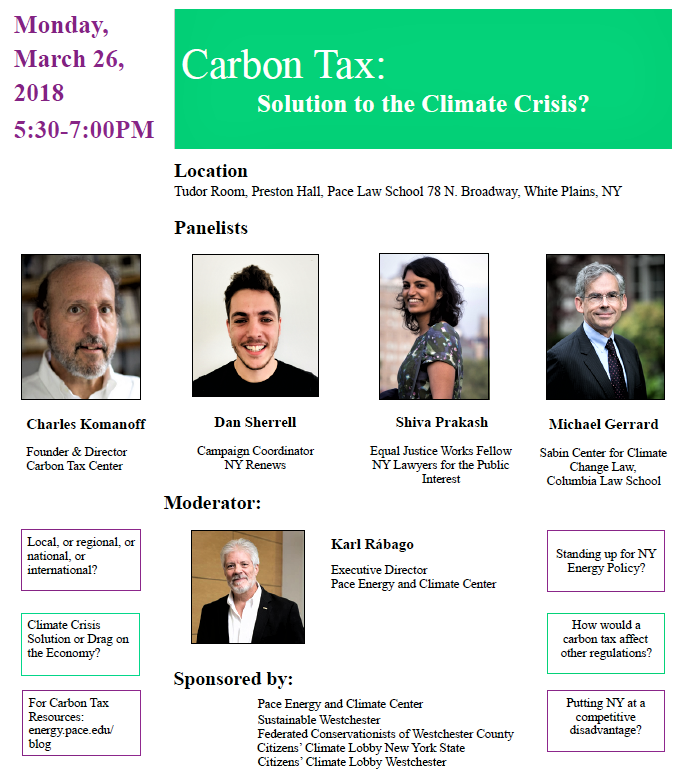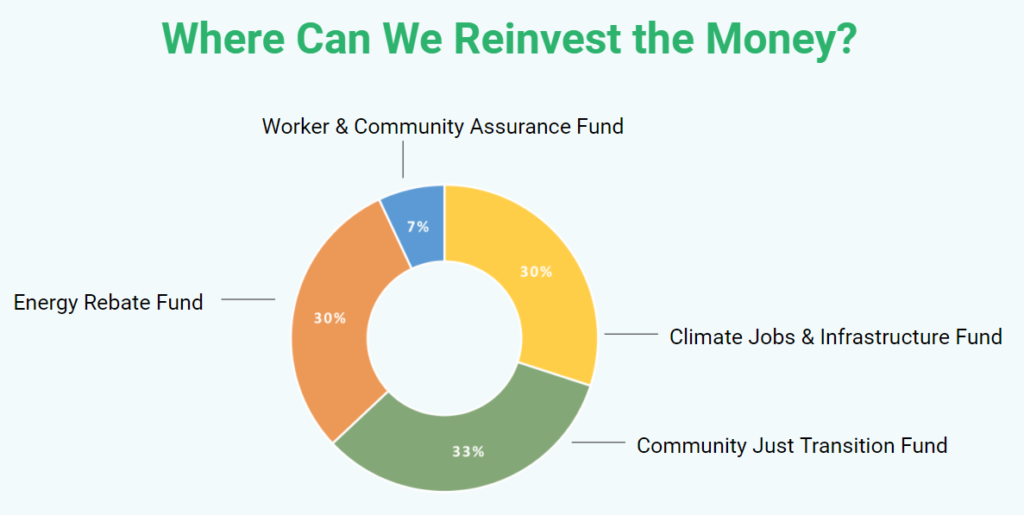The rifts over carbon pricing that have engulfed the climate movement in recent years and helped sink the 2016 Washington state carbon tax referendum softened noticeably at a public forum in New York’s Westchester County on Monday evening. Lines of convergence outweighed points of contention, perhaps signaling that proponents of transparent and robust carbon pricing can surmount our ideological differences and move forward together.
The forum, Carbon Tax: Solution to the Climate Crisis, was organized by local climate activist Andrew Ratzkin and held at Pace Law School, whose affiliate, the Pace Energy and Climate Center, has for decades been a bulwark of policy and legal analysis for energy efficiency, renewable energy and environmental taxation. While the four panelists — I was one — hale from different disciplines and generations, we were conversant with climate science, economics and organizing and respectful of each other’s endeavors.

The younger panelists, Dan Sherrell and Shiva Prakash, outlined the ambitious New York State carbon tax proposal developed by NY Renews that has attracted wide support — with sign-on from 143 organizations — through its pledges to apply the carbon revenues to protect low-income families, invest in sustainable energy technology, help workers transit out of fossil-fuel jobs, and remediate “front-line” communities disproportionately damaged by fossil fuel processing and combustion.
While there’s room to question whether spreading the revenues so broadly can achieve all four objectives, NY Renews rests its optimistic projections — which include, by 2030, a halving of New York CO2 emissions and creation of 150,000 net new jobs — on a detailed study by the U-Mass Political Economy Research Institute. The group also formulated its carbon-tax proposal through extensive consultation with advocates from labor, environment, low-income and environmental-justice communities — a far more holistic process than Carbon Washington followed in fashioning its doomed I-732 referendum, and one that should augur well for the eventual legislative effort.
You may have noticed that my description led with the proposed use of the revenues, not the level of the tax. One reason is that the carbon tax amount in any state proposal tends to be constrained by “leakage” concerns over cross-border business flight as well as the political difficulty of getting too far out front of neighboring states; for the record, the NY Renews carbon tax would start at $35 per ton of CO2 and increase indefinitely at 5 percent a year.
The other, weightier reason for emphasizing revenue use is that it has become the boulder on which carbon tax advocacy has splintered. Revenue-investment proponents like NY Renews, who tend toward the political left, want the carbon revenues applied to the “Green New Deal” elements outlined above (and shown in the graphic below) which collectively constitute what they call “the just transition” from coal, oil and gas to renewables.
An opposing revenue-neutral camp tends to be less overtly political, as exemplified by Citizens Climate Lobby, whose 60,000 national members insist on equal return of carbon “dividends” to households as a way of skirting left vs. right fights and building constituencies of support for raising the carbon tax or fee level (since the dividend checks rise at the same rate). The revenue-neutral camp also places greater trust in the ability of the carbon-price signal to motivate pervasive changes in investment, behavior, technology and societal values that will effectuate the flight from fossil fuels, whereas revenue-investors tend to disdain “market forces” and to eye carbon taxes primarily as a revenue source to pay for socially driven and governed wind, solar, weatherization, public transit and electrification.
While these categories are a gross simplification, a synthesis of sorts appeared to come into view on Pace at Monday, along these lines:
- Taxing carbon emissions is so essential AND politically difficult that establishing a U.S. beachhead is more important than demanding a perfect version.
- The impossibility of enacting a carbon tax at the federal level till at least 2021 leaves states as the locus for that beachhead for several years or more.
- Several factors render revenue-neutrality less imperative in state than federal carbon-taxing:
- The lower tax rates in most state proposals imply lesser need to dedicate revenues to dividends or other income-support;
- Greater political and cultural cohesion within states allows tailoring carbon-revenue investment to be more politically palatable;
- Greater role of coalition politics makes some revenue investment necessary to pass state legislation.
While it’s possible or even likely that initial state carbon taxes that are heavy on revenue investment might repel red-state members of Congress as “Christmas-tree” packages, that specter seems less salient than the need to get some carbon-tax boots on the ground — not to mention the need to overturn the G.O.P. majorities and shrink climate-denialist representation in Congress, period.

NY Renews’ proposed state carbon tax allocations.
These bullet points sharpen somewhat the long-established position of the Carbon Tax Center to support virtually any carbon tax formulation that doesn’t demonstrably worsen economic inequality. Still problematic for CTC, however, is the insistence of many revenue-investment adherents that their Just Transition include substantial allocations — as much as one-third, in the NY Renews proposal — to offset and remediate disproportionate fossil-fuel impacts on front-line communities.
Our position, which co-panelist Michael Gerrard also voiced, is that the fastest and surest way to reduce and eliminate those environmental injustices is to enact and ramp up the highest carbon tax that’s politically imaginable. Both Michael and CTC premise this on our conviction that the price signal itself is the salient policy tool within the carbon tax, and that a robust carbon charge will create powerful and ultimately irresistible incentives to reduce and eliminate fossil fuel use — and, thus, emissions and other impacts — across-the-board, not just in selected (wealthy and white) communities. It follows, then, that all communities, including but not limited to environmental-justice communities, will be better protected from both climate damage and “traditional” environmental insults if carbon tax proposals are free from what some lawmakers may consider special dispensations and can be legislated as high as possible.
We at CTC took a first stab at articulating this position in a 2016 blog post. We hope to elaborate on it soon and to elicit responses from NY Renews and other climate activists who carry the environmental-justice carbon-tax banner.

Drew Keeling says
While sympathetic to not letting perfect block good, I have doubts about the viability of “get some carbon-tax boots on the ground” as a prime objective. British Columbia has already had one for nearly a decade, showing modest success with no great objection or opposition. A first US state carbon tax, which then flopped (like Australia’s) might be worse than no US carbon tax at all.
I see two key drawbacks of not going revenue neutral:
(a) This would undeniably be a “tax.” Thereby -until such time as public economic illiteracy can be overcome by more efficacious arguments for Pigovian taxes- almost guaranteeing a “third rail effect.”
(b) Even for voters tolerant of a “tax” -as an urgently-needed price signal corrective, there would remain political uncertainty as to how well-spent the proceeds might be. Spreading revenues amongst diverse “progressive” causes would risk exciting no supporting contingent greatly, and “conservative” voters even less so. Such a log-rolling approach would thus seem relatively unpromising, even without widespread public “taxophobia.”
A key hurdle for any carbon pricing scheme is the impact on lower income groups, especially those with little alternative to carbon fuels. A viable response might well be to enact a revenue neutral tax but refund the revenues progressively rather than equally per taxpayer. This would unambiguously generate more cash income for people who have less of it. “Conservative” voters would likely not praise the redistributional aspect, but could not legitimately complain about wasteful boondoggling. Moreover, a “refunded” tax (or “fee and dividend”) leaving the size of government unchanged might have broad appeal, perhaps bolstered by a “compromise” scrapping of some regulatory fuel mandates, some of which arguably are neither very effective nor have the permanence of statutory protection (Obama’s power plant rules).
Ultimately, I submit, the main obstacles to adopting a carbon tax today are the same general hindrances to any kind of political reform, and -notwithstanding (welcome) positive vibes at the recent Pace meeting- the most prominent carbon pricing advocacy, of late appears to be coming from remnants of what was once the “moderate conservative” camp. For these reasons, a bold but ideologically-neutral “ramp up the highest carbon tax imaginable” push would, in my view, deserve serious consideration at least and probably vigorous support.
David Collins says
For the present and the past few decades, the first bullet point is the essence of the argument; the rest are commentary.
Seeking sane, rational¸ intelligent opposition to the proper Carbon Tax is a wild goose chase. There are persons of sound mind and good will who oppose it (e.g. Van Jones), but their arguments indicate that they have trouble with the nonlinear thinking involved. In particular, their insistence on earmarking carbon tax revenues for specific ends. (This is not a simple issue I will not delve into.)
I recently read an editorial in INVESTOR’S BUSINESS DAILY:
Unsurprisingly, it opposes carbon taxes. Its arguments are invalid for a range of reasons not relevant here; I introduce it because in it one can discern some basic elements of the opposition. In simple terms, the writer does not like anything that gets in the way of rising profitability and profits from the combustion of fossil fuels. Wishing it and saying it so does not make it so. Opposition thus based cannot be argued against successfully. There is no rational response to irrationality.
At this time, I have not the foggiest idea of what will work. I can only propose putting rational arguments to those of good will who oppose the proper Carbon Tax. I fear that by the time the only recourse will be torches, tumbrels and Remington 870’s, it will be too late.
David Collins says
Sorry, I forgot to paste the link to the referenced editorial…
https://www.investors.com/politics/editorials/carbon-tax-a-bad-idea-whose-time-should-never-come/